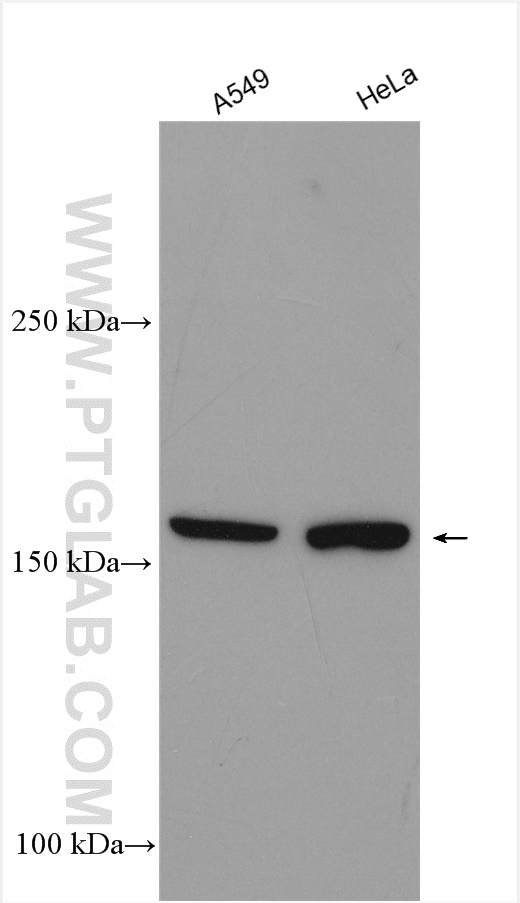验证数据展示
产品信息
55354-1-PBS targets JMJD3 in WB, Indirect ELISA applications and shows reactivity with human samples.
| 经测试应用 | WB, Indirect ELISA Application Description |
| 经测试反应性 | human |
| 免疫原 | Peptide 种属同源性预测 |
| 宿主/亚型 | Rabbit / IgG |
| 抗体类别 | Polyclonal |
| 产品类型 | Antibody |
| 全称 | jumonji domain containing 3, histone lysine demethylase |
| 别名 | |
| 计算分子量 | 177 kDa |
| 观测分子量 | 177 kDa |
| GenBank蛋白编号 | NM_001080424 |
| 基因名称 | JMJD3 |
| Gene ID (NCBI) | 23135 |
| 偶联类型 | Unconjugated |
| 形式 | Liquid |
| 纯化方式 | Antigen affinity purification |
| UNIPROT ID | O15054 |
| 储存缓冲液 | PBS only , pH 7.3 |
| 储存条件 | Store at -80°C. The product is shipped with ice packs. Upon receipt, store it immediately at -80°C |
背景介绍
JMJD3, also known as KDM6B, is a 1643 amino acid protein, which belongs to the UTX family. JMJD3 is a Histone demethylase that specifically demethylates 'Lys-27' of histone H3, thereby playing a central role in histone code (PubMed:17825402, PubMed:17851529, ). JMJD3 demethylates trimethylated and dimethylated H3 'Lys-27', so it Plays a central role in regulation of posterior development, by regulating HOX gene expression (PubMed:17851529). Histone demethylases are epigenetic actors with a crucial role in cancer by acting as suppressors of tumors or as oncogenes. JMJD3 and UTX (ubiquitously transcribed tetratricopeptide repeat, X chromosome) are transcription activators, being specific H3K27me3 demethylases. JMJD3 is involved in many cellular process such as development, differentiation, senescence and aging by p16, p53 and RB pathways and finally inflammation. Depending on cancer type, JMJD3 expression is increased (prostate and breast cancers, melanoma, gliomas, renal cell carcinoma or decreased (lung, liver, pancreatic, colon and colorectal cancers. This role in carcinogenesis has allowed the development of "epidrugs" to modulate JMJD3 expression (PMID: 29805743 ).
